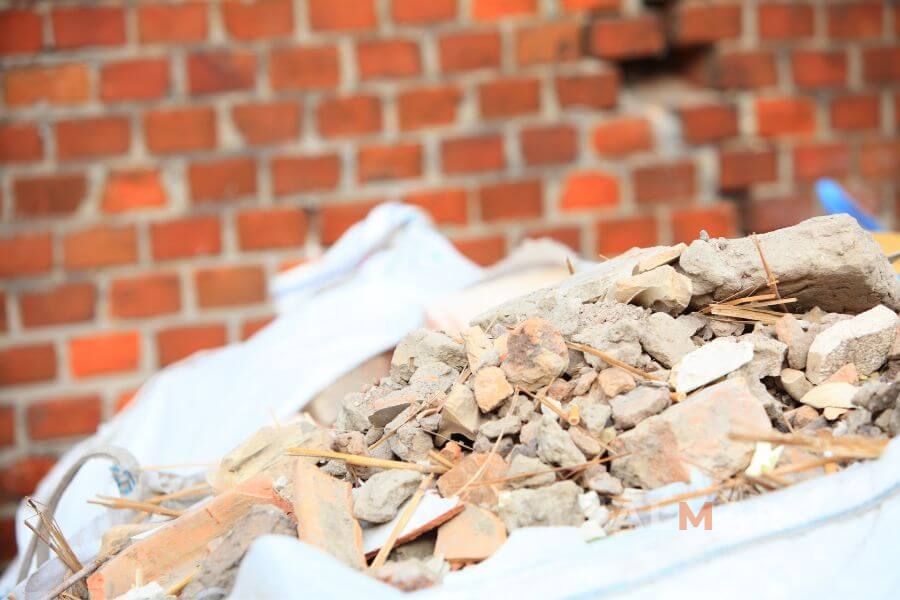Properly managing waste after a professional demolition service ensures a clean and safe environment and helps preserve our natural resources. Recycling and responsible disposal of waste minimize landfill impact and promote a greener future for Canada.
Contractors, developers and individuals should understand the best practices and regulations for managing post-demolition waste. In this article, we will explore various options for managing waste after a demolition, discuss the significance of demolition waste management, highlight sustainable practices, and shed light on responsible waste disposal.
The benefits of recycling construction debris
Recycling construction debris plays a vital role in sustainable waste management. By recycling these materials, we reduce the amount of waste being sent to landfills. Additionally, recycling construction debris allows for the recovery and reuse of valuable resources, reducing the need for virgin materials.
- Recycle concrete to help reduce water usage and carbon emissions associated with the production of new concrete.
- Reuse wood from demolition projects to minimize the demand for timber, preserving forests.
- Recycle metals to help conserve natural resources and reduce the energy required for mining and refining.
- Repurpose plastics to reduce dependence on fossil fuels needed for plastic production.
Overall, recycling construction debris not only benefits the environment but also contributes to a more sustainable construction industry.

Eco-friendly waste management solutions
In addition to recycling, demolition projects can implement other eco-friendly waste management solutions to minimize waste and promote sustainability.
Implement proper waste segregation on-site by separating recyclable materials from non-recyclables. Maximize salvage and material reuse to preserve valuable resources and reduce environmental impact. Utilize innovative technologies and equipment to optimize waste management processes. Collaborate with waste disposal facilities that prioritize environmental responsibility.
Adopting these eco-friendly waste management solutions minimizes the environmental footprint of demolition projects and contributes to a cleaner and greener future.
Sustainable Demolition Practices
When it comes to demolition, adopting sustainable practices is crucial to reducing waste post-demolition and promoting eco-friendly techniques. At our company, we prioritize these sustainable demolition practices to minimize our environmental impact and contribute to a greener future.
Deconstruction
Deconstruction requires carefully dismantling a structure to salvage valuable materials for reuse. Dismantling buildings piece by piece significantly reduces the waste ending up in landfills. This approach conserves resources and supports the local economy by supplying reusable materials for future construction projects.
Salvage and Material Reuse
During the demolition process, we carefully identify salvageable materials that can be reused in other projects. We salvage items like doors, windows, and lighting fixtures, extend their lifespan and reduce the need for newly manufactured replacements. Our team ensures that these materials are properly stored, and ready to be repurposed or donated to organizations and individuals in need.
Responsible Disposal of Construction Debris in Canada
Local waste management rules are crucial for construction and demolition work. They detail how to dispose of debris correctly. Not following these rules can lead to serious consequences.
Construction entities and individuals should focus on responsible waste disposal. This helps make the environment cleaner and more sustainable. Working with licensed facilities ensures debris is disposed of properly.
Options for Recycling Construction Debris
- Concrete recycling: Concrete can be crushed and processed into recycled aggregate, which can then be used as a base material for new construction projects.
- Asphalt recycling: Asphalt pavement can be milled and recycled into recycled asphalt pavement (RAP), which can be used as a component in new asphalt mixtures.
- Wood recycling: Used wood from construction sites can be chipped, shredded, or processed into mulch, compost, or biomass fuel.
- Metal recycling: Various metals found in construction waste, such as steel and aluminum, can be collected and recycled to conserve natural resources.
- Plastic recycling: Certain types of construction plastics, such as PVC pipes and packaging materials, can be melted down and processed into new plastic products.
By utilizing these recycling options and collaborating with waste removal services that prioritize sustainability, construction companies can effectively contribute to the circular economy and minimize their environmental footprint.
Proper waste management is essential in the demolition industry to ensure the safety of workers, the community, and the environment. At ALMAR Demolition, we have a team of experts who are trained to handle waste safely and in compliance with all local, provincial, and federal regulations. We are committed to protecting the environment and reducing the amount of waste that ends up in landfills by recycling as much waste as possible. Contact us today for a free, detailed quote for your demolition project.
